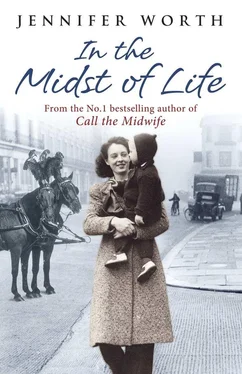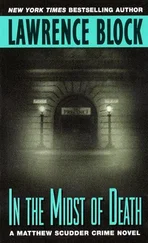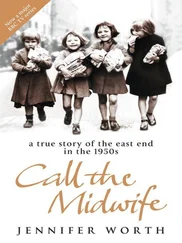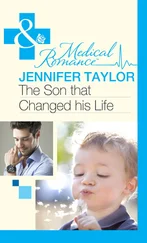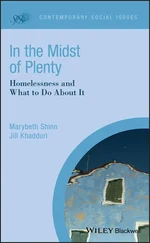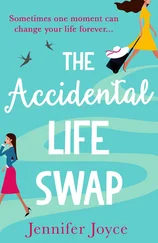Jennifer Worth - In the Midst of Life
Здесь есть возможность читать онлайн «Jennifer Worth - In the Midst of Life» весь текст электронной книги совершенно бесплатно (целиком полную версию без сокращений). В некоторых случаях можно слушать аудио, скачать через торрент в формате fb2 и присутствует краткое содержание. Жанр: Биографии и Мемуары, на английском языке. Описание произведения, (предисловие) а так же отзывы посетителей доступны на портале библиотеки ЛибКат.
- Название:In the Midst of Life
- Автор:
- Жанр:
- Год:неизвестен
- ISBN:нет данных
- Рейтинг книги:3 / 5. Голосов: 1
-
Избранное:Добавить в избранное
- Отзывы:
-
Ваша оценка:
- 60
- 1
- 2
- 3
- 4
- 5
In the Midst of Life: краткое содержание, описание и аннотация
Предлагаем к чтению аннотацию, описание, краткое содержание или предисловие (зависит от того, что написал сам автор книги «In the Midst of Life»). Если вы не нашли необходимую информацию о книге — напишите в комментариях, мы постараемся отыскать её.
In the Midst of Life — читать онлайн бесплатно полную книгу (весь текст) целиком
Ниже представлен текст книги, разбитый по страницам. Система сохранения места последней прочитанной страницы, позволяет с удобством читать онлайн бесплатно книгу «In the Midst of Life», без необходимости каждый раз заново искать на чём Вы остановились. Поставьте закладку, и сможете в любой момент перейти на страницу, на которой закончили чтение.
Интервал:
Закладка:
I didn’t like to ask him how music had saved his life - it seemed too personal and intrusive -but I wanted to. So I said instead,
You have played all your life, then?’
Yes, since early childhood. We all played, my parents and brothers and sisters. It was expected of us for that was the way of life for a good Jewish family in Vienna at the turn of the century. My sister Freya was the most talented. She was the most beautiful violinist I have ever heard.’
‘I suppose she is a professional now?’
‘No.’ He stopped, and turning his back on me, opened the violin case, slackened his bow and put the instrument away. He turned and closed the music book, before saying: ‘No, Freya is dead. She will not play again.’
‘I’m sorry to hear it. Was it an illness?’
He hesitated, then picked up the music stand and placed it in the corner.
‘I suppose it must have been. The body can stand so much and no more. But I’m not really sure. Come now, shall we go outside? On a beautiful evening like this I am going to sit by my door and watch the world go by.’
‘And I must return to the convent.’
We shook hands on parting, then I said, quickly and shyly, ‘You will play for me again, won’t you?’
‘It will be more than a pleasure, it will be a privilege.’
On the following morning as we were going through the day list I asked Sister Julienne, the head of the order of nuns with whom I was working, if she knew anything about Dr Hyem. She said,
‘I only know that he is an Austrian Jew who came to this country shortly after the war. The Jews from all over Europe were looking for somewhere to settle.’
I remembered the photograph of a young woman and four little children, and his saying, ‘I’m not really sure how they died.’
‘Do you think he or his family were in concentration camps?’ I asked Sister Julienne, who knew everything, I always felt.
‘I do not know, but it is very likely. You must remember that over six million Jews died. I doubt if there are any European Jews alive today who have not lost relatives. We must all pray for healing.’
Later I learned that Dr Hyem had tragically lost his wife and four children to starvation in an ill-fated attempt to return to Vienna to save his sister Freya.
It became a real joy to me, visiting Dr Hyem. Controlling his diabetes was not difficult, and we always found time to talk about other things that interested us both. One day I had the sauce to ask him, ‘Why do you live in a place like this. You are a cultivated man. Surely you could find somewhere better?’
His eyes wrinkled at the corners in the way that was so attractive.
‘Now that, Nurse, is where you are wrong. I do not think I could find anywhere better in the world to live. I have two rooms, which are waterproof, and I have a roof over my head. I have my very own private lavatory. What more can a man ask? And for all this, I assure you, the rent is very low.’
‘But the environment, the people … They are just not your type.’
‘Again, my dear young lady, you are wrong. From my eyrie I look over the docks, a fascination I had not thought possible until I proved it for myself. The light falls upon the water at different times of day and shows me a thousand different beauties, which are never repeated, but always changing. The cargo boats come and go. The men toil and the women work. As for the people, I like them. Canada Buildings can be described as a microcosm of all life, and humanity is my study.’
Once, when I was showing him how to inject his own insulin, and watching his ham-fisted attempts to insert the needle, I said, ‘You are obviously not a real doctor, then?’
‘If by that you mean a doctor of medicine, no, I am not. I am a doctor of analytical psychology.’
A psychiatrist?’
‘No. A psychiatrist in this country must first be a medical practitioner, which I am not. Thirty years ago I studied in Zürich with Dr Carl Jung, the greatest thinker and interpreter of the human mind of the century, in my opinion.’
‘So that was your job?’
His eyes crinkled again and he gave me a funny look.
‘Yes, that was my “job”, as you so accurately describe.’
‘Do you do it now?’ (What a sauce the young have!)
‘No. And I know your next question will be “why?” So I will tell you. Frankly, in this country, under your new National Health Service, I do not think I could earn a living. I am not qualified to practice in this country. So I earn my living as a translator.’
‘What do you translate?’
‘Mostly psychoanalytical treatises and papers for journals in French, German, Italian and Dutch.’
You are very clever to speak and write so many languages.’
‘In my father’s house we all had to learn the principal European languages. My mother was Swiss and had been brought up to speak three languages fluently, and she taught her children likewise.’
I walked around the room and ran my fingers over some of the leather bindings, which were beautiful to the touch. The titles were in several different languages, including English, but there was a collection that looked like nothing on earth to me.
‘What are these?’ I asked.
Again he gave me that funny look, his eyes smiling.
‘That is my Greek collection. It is necessary for an educated man or woman to be conversant in Latin and Greek. These two are the fundamental languages of civilisation.
I must have looked thoughtful, because he said: ‘What are you thinking?’
‘I love your books, I love your music; I love your elegant rooms … everything.’
The Wigmore Hall was crowded. I felt a tap on the shoulder and turned round. Dr Conrad Hyem was smiling at me.
‘What an unexpected pleasure,’ he exclaimed.
It was truly delightful to see him. We had not met for three months because he was controlling his diabetes satisfactorily by injecting himself, and he did not need our visits. I regretted the loss of his wonderful company, and would have liked to continue seeing him, but that was just not possible. As a nurse, I could not visit the flat of a single gentleman who had formerly been a patient, without bringing disrepute not only to myself but also, which was far more important, to the order of nuns for whom I worked. But meeting at the Wigmore Hall, quite by chance, was a different matter.
We went to the bar and he offered me a drink.
‘Well, only water, at the moment. I never drink alcohol before or during a performance because I like to keep my wits about me to listen to the music. But I’ll have a drink later, if the offer is still there.’
‘It will be a pleasure, and I’ll hold you to that. But for now we will have water. I myself can never understand people who come to hear beautiful music then dull their minds with alcohol.’
After the concert, Dr Hyem said:
‘Do not forget you are going to have a drink with me, and would you like a little supper also?’
‘That would be perfectly lovely. Thank you!’
Dr Hyem and I had a delightful supper in a small restaurant in Upper Regent Street. He, being diabetic, had to be careful about what he ate, but I had no such constraints, and ate more than he did. He watched me, I thought, with amusement, because his eyes were crinkling at the corners. Then he said,
‘You have never been hungry?’
‘Me? Don’t you believe it. I’m always hungry. I eat a huge breakfast most days, cakes or biscuits if I can get them at eleven, a huge lunch with two puddings if possible, tea with more cakes or biscuits, supper at seven – and I’m still hungry. That is why I can eat a second supper now, at eleven o’clock.’
The moment I had spoken I was aware of my callous insensitivity to a man who had lost his entire family from starvation.
Читать дальшеИнтервал:
Закладка:
Похожие книги на «In the Midst of Life»
Представляем Вашему вниманию похожие книги на «In the Midst of Life» списком для выбора. Мы отобрали схожую по названию и смыслу литературу в надежде предоставить читателям больше вариантов отыскать новые, интересные, ещё непрочитанные произведения.
Обсуждение, отзывы о книге «In the Midst of Life» и просто собственные мнения читателей. Оставьте ваши комментарии, напишите, что Вы думаете о произведении, его смысле или главных героях. Укажите что конкретно понравилось, а что нет, и почему Вы так считаете.
